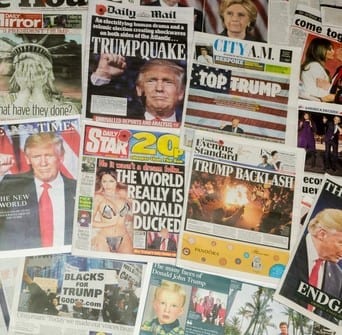Trump Lawyer’s $130K To Porn Actress Raises Legal Ethics Questions
February 16, 2018

There are a number of ways to look at the $130,000 that President Trump’s personal lawyer recently admitted that he paid to a former porn movie actress. All of them, according to sources quoted in a New York Times article, raising potentially serious legal and/or ethical issues. Was it an undocumented loan? A campaign contribution? Was it conduct involving “dishonesty, fraud, deceit or misrepresentation”? And was the admission itself a breach of contract? The attorney, Michael D. Cohen, acknowledged that he paid $130,000 to actress Stephanie Clifford shortly before the 2016 election, and he says it was his own money. He declined, in his brief interview with New York Times reporters, to say whether he was later reimbursed. In 2011 Clifford, whose professional name is Stormy Daniels, gave a now resurrected interview in the tabloid In Touch, in which she detailed a 2006 affair with Donald Trump. She says it included one sexual encounter, preceded by his suggestion he could prevail on NBC to get her “on” – presumably on The Celebrity Apprentice tv show. That never happened, and she says that even the night he broached it she figured it was 50-50. In the interview Daniels comes off as a self-reflective, notably non-vindictive person, giving a matter-of-fact account of something that occurred in an earlier period of her life. Trump comes off as crass and deceptive, but you might say it could have been worse. (He was “nice, intelligent in conversation,” she says, and the sex “textbook generic … what you would expect someone his age to do. It wasn’t bad. Don’t get me wrong.”) In January of this year Daniels denied the affair ever happened, or at least she did not prevent a statement saying as much from being released, an ambiguity that was not resolved during her appearance on the Jimmy Kimmel show on January 30. If a denial was what she was paid for, we may soon find out more because, according to her manager, she believes Cohen’s public acknowledgment of the payment is a breach of their confidentiality agreement and she now plans to tell her side of the story to the media. Cohen, meanwhile, is likely to find himself under some scrutiny, although it would be foolhardy to start writing his epitaph at this point. The Times article, noting he has worked for Trump for more than a decade, characterizes him as “part fixer, part pit bull.” But The Times also quotes Charles Wolfram, an emeritus professor of legal ethics at Cornell University, who says, although more facts are needed, it appears Cohen’s payment to Daniels raises a host of potential issues. “The thing seems so weird that it invites an inquiry into what you’re doing,” he said. “Lawyers don’t go around giving $130,000 to strangers, benefiting their clients, without billing their clients.”
Read full article at:
Daily Updates
Sign up for our free daily newsletter for the latest news and business legal developments.




